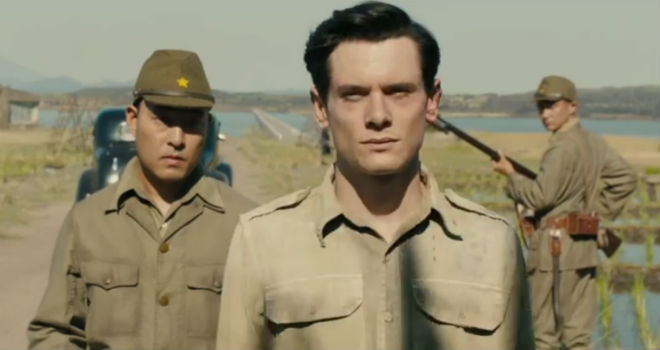In any conventional biopic, a lifetime must be compressed, neatly adapted into a three act structure, and cohesively conveyed over the course of two hours. Often, we’ll observe some kind of narrative build towards the subject’s key defining moment, epiphanic and profound enough to justify its adaptation to celluloid. The life of the late Louis Zamperini is essentially a series of such moments, and could easily have been made into any number of films. Olympic athlete, US Army Lieutenant, shipwrecked cast away and prisoner of war (in that order), his story is one that has long seemed tailor made for big-screen adaptation, and after decades in development, it arrives in the form of Angelina Jolie’s Unbroken. Adapted from Laura Hillenbrand’s 2010 biography,Jolie’s portrait of the life of Zamperini is a well-intentioned, infrequently rousing picture that is reverential to a fault, lumbered by an ambling, episodic narrative that strives to provide ample screen-time to each of Zamperini’s numerous achievements.
An impressively-executed opening sequence drops us into battle aboard a US fighter jet, introducing us to the young Zamperini (Jack O’ Connell) as he strives to keep a level head amidst the carnage. We then jump back to Louis’ early years growing up as the youngest son in a struggling Italian family in Torrance, California. Encouraged by older brother Pete, Louis joins the school track team and flourishes as a runner, qualifying for the Olympics before his 20th birthday. Flash forward to 1943, where following an air crash, Louis spends 47 days marooned at sea alongside pilot Russell Allen Phillips (Domhnall Gleeson) and Francis MacNamara (Finn Wittrock). From one ordeal onto another, Louis is captured by Japanese Forces and held as a prisoner of war, singled out by sadistic prison guard ‘The Bird’ (Miyavi) who represents the most serious threat to his spirit yet.
One can’t fail to marvel at the fact that this all happened to one person. Jolie’s film adopts a prestigious, classical Hollywood approach to the material, further compounding the old-fashioned sensibility of the script’s you-can-do-it message. Unbroken consistently invites comparisons with other films that tread similar thematic ground, each of its sections providing visual echoes of the likes of Chariots of Fire, Schindler’s List and Rescue Dawn, amongst others. Such flattering comparisons speak of a palpable determination to craft an old-fashioned, David Lean-indebted epic around the man’s life, yet with its narrative unwieldiness and various indulgences, the film’s rigorous commitment to upholding the Zamperini legend will no doubt test both audiences’ patience and bladders.
Unbroken chugs along in no particular hurry, its 137 minute running time lending significant screen time to each of its protagonist’s respective achievements. Zamperini’s trip to the Berlin Olympics serves little purpose than to show off the film’s VFX budget, whilst providing yet another sequence amongst many in which one man achieves magnificent feats in a film positively stuffed with them. There’s also a severe clunkiness in the script’s attempts to unify the man’s respective achievements, reaching its nadir in one scene when, upon his departure for Berlin, Louis’ brother Pete (Alex Russell) bids him farewell with the bizarre exclamation ‘A moment of pain is worth a lifetime of glory!’.
Thematically, one could hardly argue that Unbroken is unfocused, and despite its indulgences and some misjudged direction, it’s elevated by its excellent performances, typically stellar cinematography from Roger Deakins and a rousing Alexandre Desplat score. It’s to O’Connell’s credit that following a breakout year in home-grown knockouts Starred Up and ’71, he holds his own at the centre of this $65 million epic. In a role which reads somewhat one-note on paper, the 24-year-old’s undoubtable charisma lends the film a much-needed personality, whilst his signature physicality instils Zamperini with a darkness at his most trying moments. This comes to the fore in Unbroken’s gruelling third act, taking place in the Japanese war camps. Perhaps the film’s strongest section, Louis is finally provided with an antagonist that is neither elemental nor spiritual in the shape of The Bird. Tense and emotionally testing, Zamperini’s time in the camps could have made for compelling standalone picture, yet by this point the film truly has truly begun to feel its length, the emotive climax giving way to a conclusion that offers not so much catharsis as a bare sense of relief.

